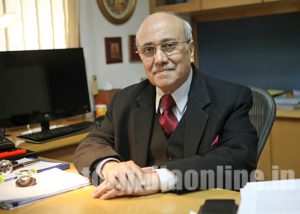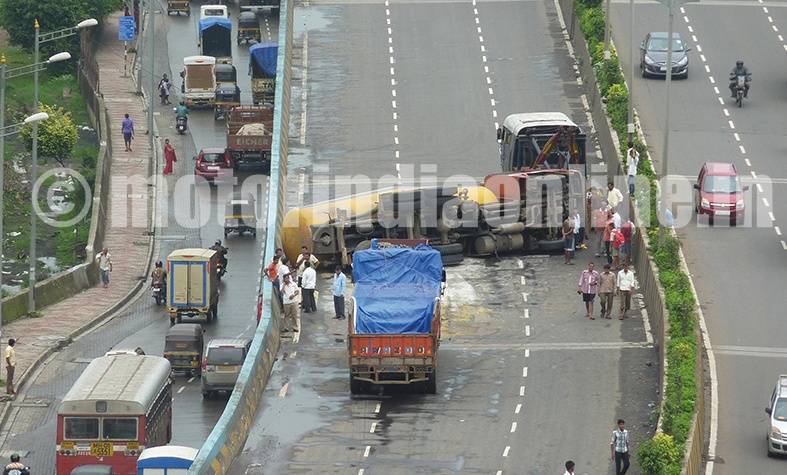The International Road Federation (IRF) is a non-governmental, not-for-profit organisation with the mission to encourage and promote development and maintenance of better, safer and more sustainable roads and road networks. Working together with its members and associates, IRF promotes social and economic benefits that flow from well-planned and environmentally sound road transport network, apart from putting in place technological solutions and management practices that provide maximum economic and social returns from national road investments. IRF has a major role to play in all aspects of road policy and development worldwide. For governments and financial institutions, it provides a wide base of expertise for planning road development strategy and policy.

To learn a bit more about it, MOTORINDIA catches up with Mr. Kiran K. Kapila, IRF Chairman, who affirmed that accidental road deaths will reduce by 2020 and will be eradicated by 2040.
It is a known fact that IRF was constituted to encourage and promote development and maintenance of road networks. Would you like to elaborate? Besides, what have been your key accomplishments so far?
IRF was established, as you had rightly mentioned, to basically encourage and promote the development and maintenance of safe roads. Besides this, IRF brings road policy makers and other stake-holders in roads and transport segments together to interact and help in advocacy to share best practices amongst them. We focus on four major areas – Road Safety, Public Private Partnership in Road Financing, Environment and Sustainability, Intelligent Transport Systems, safe and smart mobility. We added ‘Safe and Smart Mobility’ to our domain about four years back. Since I took over as Chairman of IRF, my primary focus has been on saving precious human lives from road accident fatalities. That can only happen if you have safe roads and smart and safe mobility. They complement each other as one without the other does not give you the desired results. Therefore, we work in both the areas.
A major accomplishment was working along with other key stake-holders to influence leaders to appreciate the concern which eventually resulted in the UN General Assembly passing a resolution in 2010 called ‘The decade of Action Plan’, wherein it was resolved that the road related fatalities on account of road traffic accidents will be reduced by 50% by 2020. There was a mid-term review of the UN Decade of Action held in November 2015 in Brazil. In this review meet, it was realized that not much was achieved with regard to reduction in fatalities. However, sensitizing of the road users about the importance of road safety and its pursuit in a concerted manner was achieved.
IRF is now consistently working towards achieving the decadal goal and we have taken various initiatives in this regard. For instance, we have worked on Engineering of Safe Roads and have come out with guidelines on constructing ‘Forgiving Roads’, on which a person meeting with an accident might get injured but will not die. As a result of the deliberations in one of the IRF regional conferences, this issue had come up and thereafter the Union Ministry of Road Transport and Highways had issued a circular in April 2010 which had recommended that only ‘Forgiving Roads’ must be built. As regards the road mobility, we are working relentlessly on the need for safer vehicles which involves introduction of ABS, airbags, foglights, tropical climate-specific helmets, alcolocks, etc. Besides, we are also working on bringing in front, side and back under-protection covering in heavy commercial vehicles, including trucks and buses.
If I am not mistaken, road safety continues to be the topmost priority of IRF. What steps are you taking to achieve the UN’s mission of reducing road fatalities by 50% by 2020?
We are pursuing our efforts for safer roads through earmarking black spots at places where accidents are repeatedly happening. The Government has also launched a programme for removing black spots.
The other important activity is to undertake road safety audits before, during and after construction of roads so that we don’t create more black spots. Apart from that, we are also involved in building of underpasses wherever they are required. For example, if there is a village on the opposite side and the villagers need to cross the road, they are bound to be accident-prone. By building underpasses, we are saving their lives.
Expenditure on road safety is now exempted under 80G of the Income-Tax Act as companies can invest on road safety-related works through funding available under the Corporate Social Responsibility (CSR). MPs, MLAs and MLCs can spend on road safety through their respective local area development funds.
For saving the life of cyclists who cannot be seen during dark hours, we have advocated for mandatory provision of an adequate number of reflectors on bicycle. Besides this, we are making efforts to make affixing of retro reflective tapes on bicycle at designated places also Mandatory.
How can development of roads be considered as social and environmental progress, besides economic development? Where does India stand in the global scheme of things?
Road development essentially brings in connectivity. Villagers are able to bring their produce to the bigger ‘mandis’ in districts. This connectivity brings them the social upliftment as they can transport their goods more conveniently and get better price for their yield. Then, there is also connectivity to educational institutions, as children can go to schools and colleges through better roads. So it is an across-the-board social upliftment, made possible through this connectivity. India has done reasonably well in this regard as we have villages with population over 1000, connected to a road system in the country. Efforts are underway to connect villages with a population of over 500 persons.
IRF has urged India to become a signatory to the Vienna Convention on Road Traffic and be on par with international standards? Are we moving in that direction?
It should have moved faster and I hope it will happen fairly soon. Once that happens, we will have to adhere to certain standards in road traffic which will ultimately lead to the reduction in road accidents.
Apart from the ban on overloaded trucks, the Government is also mulling to amend rules to stop trucks from carrying protruding items. Do you think these are steps in the right direction to curb road accidents in the country?
Yes, this is absolutely necessary. It should have happened many years ago but better late than never. We have taken steps in this regard but they need to be fast-tracked even further. Besides this, we have also made recommendations for retro-fitment of safety technologies in old and existing vehicles (both PVs and CVs). I have also emphasized on the necessity of roping in educated people as drivers. All these recommendations are a part of the amendments to Motor Vehicle Act which has been tabled in the Parliament. It is currently with the Standing Committee of the Parliament whom I have urged very strongly to bring it back to Parliament in the next session.
How many accidental black spots have you earmarked in the country? Can you please mention them and the ones which will be earmarked?
There is no comprehensive list of black spots in the country, even though MORTH has identified and made this information public by hosting it on its website. But there is a move (by the Government) to identify and remove them, and I must congratulate Mr. Nitin Gadkari (MORTH) and also the Secretary (MORTH), Mr. Sanjay Mitra, for spearheading this. Our Road Transport Minister is very concerned with the black spots removal and such a step is good for the country. NHAI is also seriously and dedicatedly working in this regard.
What are your medium- to long-term plans to improve the road infrastructure in the country? What is your vision for IRF?
As I said earlier, we need to build safe roads. Even if you want to build 1,000 km, only build 700 km out of that but build safe roads. That is my message as far as road construction is concerned. Also, build supporting infrastructure like underpasses wherever it is required. Moreover, I urge the concerned stake-holders to provide cycle tracks in all the new roads which you are building in urban environment, particularly in addition to constructing pedestrian footpaths. We need to change the concept of designing roads in the urban environment where we get maximum deaths of vulnerable road users, cyclists, pedestrians, etc. Unless we provide adequate facilities for them, we are not doing justice with the road development.
Moreover, we have to enlighten people about ‘Road Safety through consistent media campaigns, run mass awareness programmes, provide trauma care and extended first aid trauma care facilities, to assist the accident victims in safe transportation facility. Furthermore, MPLADs and CSR of companies can be deployed for road safety today. My vision for IRF is that we shall continue to work relentlessly to achieve the target of reduction in road deaths and fatalities in the world by 50% by 2020 and eventually eradicate road accidental deaths by 2040.
